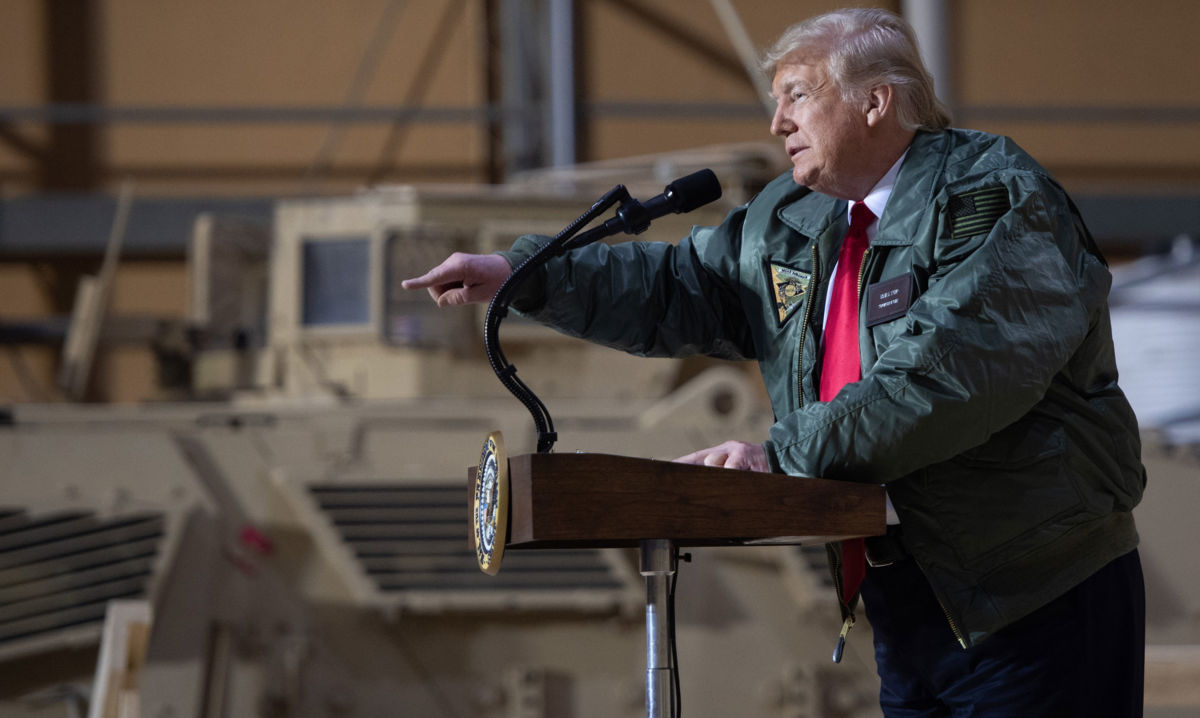Did you know that Truthout is a nonprofit and independently funded by readers like you? If you value what we do, please support our work with a donation.
As demands intensify for the US government to cease its “dangerous” and anti-democratic meddling in the internal affairs of Venezuela, President Donald Trump on Sunday morning said that sending US troops to the politically fractured Latin American nation is “an option” he continues to consider.
“Certainly, it’s something that’s on the—it’s an option,” Trump said during an interview with CBS’s “Face The Nation” with Margaret Brennan.
Asked by Brennan what he sees as the national security interest of sending troops or helping overthrow Venezuela’s elected president Nicolas Maduro would be, the president didn’t provide an answer. “Well I don’t want to say that,” said Trump. The president did say that Maduro requested a meeting at some point last year, but that the request was turned down.
Trump is not the only one threatening the Maduro government. On Saturday, Vice President Mike Pence said, “Maduro would do well not to test the resolve of the United States of America.” Sen. Marco Rubio (R-Fla.), one of the leading members of Congress working for regime change in Venezuela, has been openly encouraging members of the nation’s opposition—as well as members of the armed forces—to rise up in violence against the government. As journalist and media critic Adam Johnson noted, the corporate media in the US has continued to uncritically endorse this behavior with their coverage:
a major republican senator is openly calling for a military coup in Latin America and MSNBC, CNN, NYT et al are offering no pushback whatsoever, instead providing the marketing collateral for this narrative with a one-dimensional Evil Dictator narrative. https://t.co/gB6SjEQcJw
— Adam Johnson (@adamjohnsonCHI) February 3, 2019
Meanwhile, anti-war voices—even those who believe Maduro’s government is deeply problematic—are continuing to call for a negotiated settlement to the crisis in Venezuela while arguing emphatically against further US intervention.
Instead of getting involved in regime change in Venezuela, we need to learn our lessons from Syria, Libya, Yemen, Latin America, and all the other countries where intervention has failed.
A negotiated settlement is the only path toward peace.
— Ro Khanna (@RoKhanna) February 2, 2019
In a New York Times op-ed on Saturday, Francisco Rodríguez, chief economist at Torino Economics, and Jeffrey D. Sachs of at Columbia University—both experts on Latin America—issued an “urgent call for compromise” on Venezuela, arguing that the risks of further harm by the Trump administration’s provocations and “winner-take-all” approach were “extraordinary” and must be stopped.
“The U.S. track record of fomenting regime change is very poor,” wrote Rodríguez and Sachs. “In Afghanistan, incredibly, it is negotiating a peace agreement with the Taliban after 18 years of a United States-led war to defeat the Taliban. Interventions in Iraq, Syria and Libya have also led to continuous strife. There is no guarantee that Venezuela would be any different.” They continued:
The spiral of violence and chaos could start imminently. By commandeering Venezuela’s only lifeline to food supplies and oil field equipment, the United States has lit the fuse. By the Trump administration’s own estimates, sanctions will cost Venezuela’s economy $11 billion in lost oil revenue in the next year, which is equal to 94 percent of what the country spent last year in goods imports. The result is likely to be an economic and humanitarian catastrophe of a dimension never seen in our hemisphere.
We strongly urge an alternative approach, based on seeking a peaceful and negotiated transition of power rather than a winner-take-all game of chicken. We start from the proposition that the people of Venezuela should not be the victims of a power struggle between Mr. Maduro and the opposition, nor between the external backers of the two sides.
In a video posted Sunday morning, journalist Rania Khalek of InTheNow news, offered a six-minute rundown of what most US news consumers were not being told about the situation in Venezuela:
The US-backed rightwing coup in Venezuela is going to incite a civil war if the US gets its way. Here is everything the corporate media isn’t telling you about this socialist country of 30 million that the US is trying to destabilize and collapse https://t.co/xMabspwZcP
— Rania Khalek (@RaniaKhalek) February 3, 2019
The situation, Khalek notes, remains “incredible dangerous” on the ground. Even if the Americans’ chosen guy, president of the National Assembly Juan Guaido, “doesn’t get to take over Venezuela, this is going to incite violence and possible a civil war” in the country.
“As for those opposed to Maduro,” she adds, “fine, you don’t have to love him. But it’s not up to the US or anyone else to decide Venezuela’s future. After all, when has US meddling ever ended well for the people in the targeted country? Honduras, Syria, Iraq, and Libya are just a handful of a long list of countries that are worse off after US meddling. The result is always more oppression, more authoritarianism, more violence, more misery, more privatization, more corporate exploitation, and more poverty. Every single time.”
For their part, Rodríguez and Sachs urged “all sides of the political battle to find common ground to prevent bloodshed, starvation, millions more refugees or political solutions dictated by outside forces. We believe that the world, and especially the country’s neighbors, should listen to Venezuelans themselves. The United States could eventually get its way in a winner-take-all struggle, but at the grave risk of the extreme suffering of millions of Venezuelans — beyond the great suffering to date.”
Media that fights fascism
Truthout is funded almost entirely by readers — that’s why we can speak truth to power and cut against the mainstream narrative. But independent journalists at Truthout face mounting political repression under Trump.
We rely on your support to survive McCarthyist censorship. Please make a tax-deductible one-time or monthly donation.
